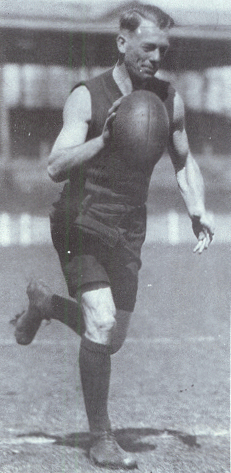- Ivor Warne-Smith
Infobox afl player NEW
playername = Ivor Warne-Smith
fullname = Ivor Phillip Scharrer Warne-Smith
image capt = Ivor Warne-Smith

birthdate = birth date|1897|10|29|df=y
birthplace =Sydney, Australia
originalteam = Wesley College
heightweight = 182cm / 86 kgs
position =
dead =
deathdate = Death date and age|1960|3|4|1897|10|29|df=y
deathplace =
currentclub = Retired
guernsey = 1919: 33, 1925-32: 14
years = 1919, 1925-32
clubs = AFL Mel
games(goals) = 146 (110)
nationalyears =
nationalteams = Victoria
nationalgames(goals) = 6 (0)
coach =
coachyears = 1928-32
coachclubs = AFL Mel
coachgames(wins) = 92 (48)
statsend = 1932
repstatsend = N/A
careerhighlights = Playing career:
* Melbourne (VFL) 1919, 1925-1932 (Games: 146 Goals: 110)
* Latrobe (NWFU) 1920-1924Player honors:
* Brownlow Medal 1926, 1928
* Runner-up Brownlow Medal 1929 (equal)
* Runner-up Cheel Medal 1923, 1924
* Latrobe premiership player 1922, 1924
* Melbourne premiership player 1926
* Melbourne Team of the Century
* Tasmanian Team of the Century
* Latrobe captain-coach 1922-1924
* Melbourne captain-coach 1928-1931
* Victorian representative (6 games, 0 goals).Coaching record:
* Melbourne 1928-32 (92 games, 48 wins, 42 losses, 2 draws)
* Latrobe 1922-1924 (premierships 1922, 1924)Ivor Warne-Smith (29 October 1897 - 4 March 1960), Australian footballer, was born in
Sydney , but his family moved toMelbourne when he was a child, and he was educated at Wesley College, where was noted both as a footballer andcricket er. [Australian Dictionary of Biography, available online [http://www.adb.online.anu.edu.au/biogs/A160589b.htm here] ] As a teenager he played for Collegians in the Metropolitan Amateur Football Association. His career was interrupted byWorld War I : he enlisted in 1915 (he was below enlistment age but pretended to be 18, as many Australians did) and served at Gallipoli and inFrance . Both his brothers were killed in the war.On returning to Melbourne in 1919 Warne-Smith joined the
Melbourne Football Club , and played eight games at centre halfback in that season. In 1920, however, he moved to Latrobe inTasmania , where he became an orchardist. From 1920 to 1924 he played as with the Latrobe club (the Diehards) in the Tasmanian North-Western Football Union (NWFU), from 1922 as captain-coach. Latrobe were premiers in 1922 and 1924 and runners up in 1923. In 1923 and 1924 he was runner-up in the NWFU'sCheel Medal for best and fairest player. He was captain of the NWFU representative team in statewide competition, and was selected to play for Tasmania in the 1924 national carnival, although he was unable to make the journey. [ [http://www.footballlegends.org/ivor_warne-smith.htm Tasmanian Football Legends] ]By 1924 Warne-Smith had such a reputation that Victorian teams were keen to bring him back to Melbourne, despite the fact that he was already 27. In 1925 he returned to the Melbourne club, where he played a further 146 games, usually in the backline. But he was also a talented ruckman and could play in the centre or forward line in required. Under his leadership Melbourne won the premiership in 1926, the club's first since 1900. From 1928 to 1931 he was both captain and coach. He officially retired from the playing at the end of 1931, but coached the club in 1932, and played in several games that season when other players were unavailable.
Warne-Smith won the
Brownlow Medal , Australian football's highest individual honour, in 1926, and again in 1928 - he was the first player to win the medal twice. He is still one of only eight players to win the Brownlow twice, and one of 11 to win the Brownlow in the same year that their team won the premiership. [The Age, 27 September 2006, sport 2] He also played for Victoria against other state sides from 1926 to 1929, and was captain of the state team in 1928 and 1929.After retiring from football Warne-Smith became a regular football writer for the Melbourne "Argus", and worked as an executive with the Vacuum Oil Co (later absorbed by Mobil). On the outbreak of
World War II , he rejoined the Army (having been initially rejected on the grounds that he was too old at 43). He served with theRoyal Australian Army Service Corps , in charge of fuel supplies, in the Middle East, theNorthern Territory ,New Guinea andBorneo . For his leadership during the Borneo operations, he wasmentioned in dispatches . He was demobilised in October 1945.In 1949 Warne-Smith became chairman of selectors for the Melbourne Football Club, a post he held until his death. He was also elected to the committee of the
Melbourne Cricket Club , which at this time controlled the Melbourne Football Club. These were greatest years in Melbourne's history: under coachNorm Smith Melbourne won premierships in 1955, 1956, 1957 and 1959. Warne-Smith was Smith's closest advisor and regarded as the club's elder statesman, becoming a life member in 1952. He retired due to ill health in 1959 and died of heart disease in 1960.In June 2000 Warne-Smith was named to the position of centre half-forward in the Melbourne Football Club's Team of the Century, in a ceremony attended by his four grandsons. In 2004 he was named in the official Tasmanian Team of the Century. He has also been made a member of the
Australian Football Hall of Fame in 1996."Ivor Warne-Smith, quiet and unassuming, was nonetheless energetic and enthusiastic in his endeavours to keep the Team up to the mark. The Club is fortunate indeed in having such a brilliant and versatile player as Coach and leader. Old and new Players alike treat his advice and instructions with the utmost respect." [Melbourne Football Club Annual Report, 1929]
"For solid, effective brilliance, Ivor Warne-Smith will always rank as one of the best players the game has known. He can play anywhere. The ruck, defence, attack, or centre positions all come alike to this brainy, sterling footballer. Warne-Smith is an astute leader, who makes some daring moves and inspires his players by his own brilliance." [Sporting Globe Football Book, 1930]
References
Wikimedia Foundation. 2010.
